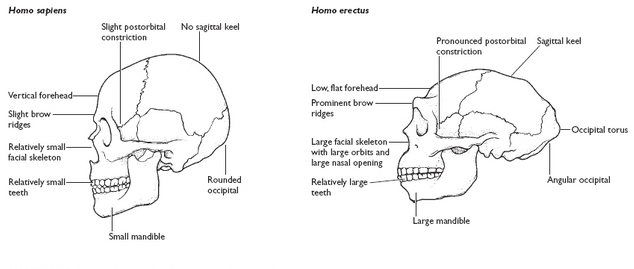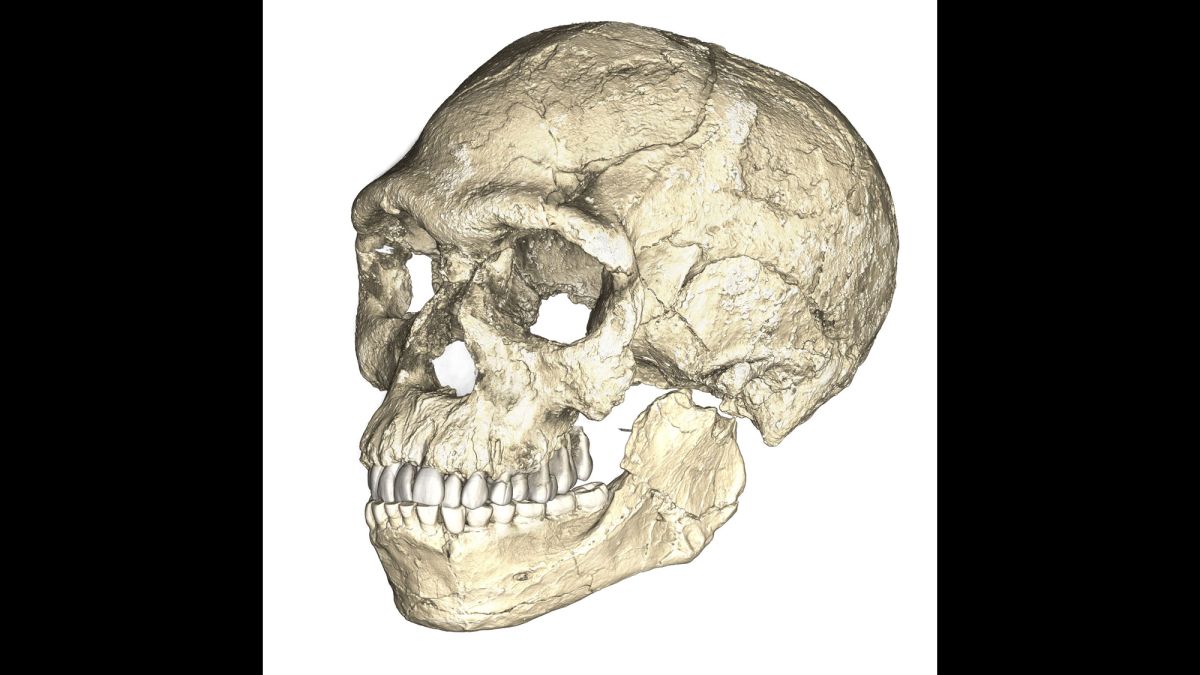Anatomical Traits Of Later Modern Homo Sapiens
However it is likely that both modern humans and Neandertals descended from Homo heidelbergensis. The average height of Homo sapiens ranges from 145 meters to 180 meters although there are cases where it becomes inferior or superior.
 Homo Sapiens Bodily Structure Britannica
Homo Sapiens Bodily Structure Britannica
Early modern human or anatomically modern human AMH are terms used to distinguish Homo sapiens that are anatomically consistent with the range of phenotypes seen in contemporary humans from extinct archaic human species.

Anatomical traits of later modern homo sapiens. Some of them are. What is a major problem with the theory that New World monkeys are descended from a North American primate. This distinction is useful especially for times and regions where anatomically modern and archaic humans co-existed for example in Paleolithic Europe.
We found that the engravings evolved over a period of 30000 y. It is estimated that the worldwide average height for an adult human male is about 171 cm 5 ft 7 in while the worldwide average height for adult human females is about 159 cm 5 ft 3 in. Their skulls are more rounded and their brow ridges generally protrude much less.
Early symbolic behavior of Homo sapiens is challenging to address yet arguably fundamental to the success of our species. There are no known Oligocene primate fossils from North America. For example the modern pelvis has gracile features along its surface and is narrower in overall width.
Our elbow and knee joint surfaces are also narrower. Homo sapiens is called wise man in Latin. The Homo sapiens is a mammalian species bipedal whose body has bilateral symmetry and having sexual dimorphism.
Females and males are distinguished by the naked eye by the characteristics of their bodies women have breasts small and vulva waists men they lack breasts are wider in muscles and have a visible penis. In its bony structure H. Small number of traits that are readily observable from a distance such as skin color hair form body build and stature.
The most obvious candidates are in the archaeological record which has traditionally begun with the appearance of Paleolithic Old Stone Age tools about 25 mya. Homo sapiens in addition to the characteristics already mentioned has biological and physical aspects that have positioned it as the dominant species. Projecting nasal bones bridge of the nose no midfacial prognathism.
Overall a modern Homo sapiens post-cranial skeleton has thinner cortical bone smoother features and more slender shapes when compared to archaic Homo sapiens Figure 123. 18 to 24 Million. Homo neanderthalensis and Homo sapiens are two species in the later stages of human evolution.
Among the oldest known remains of Homo sapiens are from Omo-Kibish I dating to about 196000 years ago Florisbad dating t. Back of the skull is rounded and indicates a reduction in neck muscles. This may mean that anatomically modern humans with their more gracile frames had become more dependent on technology than on raw physical power to meet the challenges of their environment.
Anatomical Features Timetable pelvis 15 24 Million Year Ago Homo habilis Ape-like facial features Body average 130 cm Brain capacity up to 610 cm 3 17 of body weight Small face with beginnings of slight forehead Small jaw with smaller human-like teeth but incisors were still large. In the cranium a high rounded and quite thin-boned braincase overhangs a greatly reduced face that is not expanded by large air sinuses. Paranthropus is a separate lineage from that leading to modern Homo sapiens.
Shrinkage of stature may begin in middle age in some individuals but tends to be typical in the extremely aged. Homo neanderthalensis is commonly called Neanderthal. Anatomically modern humans are distinguished from their immediate ancestors archaic homo sapiens by a number of anatomical features.
Compared to the Neandertals and other late archaic humans modern humans generally have more delicate skeletons. Anatomically modern humans have relatively gracile skeletons and teeth with crania exhibiting characteristic traits such as a vertical forehead expanded parietal bones a nonprojecting face and the presence of a chin. The story of hominin evolution is one of increasing behavioral complexity but because behaviour does not leave direct fossil evidence clues must be sought in other sources.
Archaic homo sapiens had robust skeletons indicating that they lived a physically demanding life. We used ancient engravings from the South African Blombos Cave and Diepkloof Rock Shelter in a number of controlled cognitive experiments to qualify discussions about the evolution of early symbolic traditions. Sapiens is quite distinctive boasting a relatively lightly built skeleton distinguished in many anatomic details from its closest relatives.
1200 cc 1500 cc when including Neanderthals 1400 cc. Unlike other species of Homo the skull is broadest at the top. Anatomically Modern Homo sapiens.
A skull discovered at Ngaloba Tanzania also considered Homo sapiens represents a 120000-year-old individual with a mix of archaic traits and more modern aspects like smaller facial features and. Melinda Ramsey 3 3-1 Graphic. Modern Homo sapiens skulls have a short base and a high braincase.
The fuller braincase also results in almost no post-orbital constriction or narrowing behind the eye sockets. Homo sapiens - Homo sapiens - Behavioral influences. Inherent in the typological model is the notion that there have been pure unmixed races in the past.
Modern Homo Sapiens Explorations
 Hominin Species Were Neanderthals More Than Cousins To H Sapiens
Hominin Species Were Neanderthals More Than Cousins To H Sapiens
Modern Homo Sapiens Explorations
 Ch 12 Archaic Homo Sapiens And Neandertals Flashcards Quizlet
Ch 12 Archaic Homo Sapiens And Neandertals Flashcards Quizlet
Modern Homo Sapiens Explorations
Modern Homo Sapiens Explorations
Redefining Homo Does Our Family Tree Need More Branches Earth Magazine
 The World Of Science Education Early Homo Sapien
The World Of Science Education Early Homo Sapien
 Human Evolution Increasing Brain Size Britannica
Human Evolution Increasing Brain Size Britannica
 Pin On Getting To Homo Sapiens
Pin On Getting To Homo Sapiens
 Homo Erectus Vs Homo Sapien General Difference Viva Differences
Homo Erectus Vs Homo Sapien General Difference Viva Differences
 Anatomically Modern Homo Sapiens Sciencedirect
Anatomically Modern Homo Sapiens Sciencedirect
 Oldest Homo Sapiens Fossils Discovered Cnn
Oldest Homo Sapiens Fossils Discovered Cnn
 The Rise Of Anatomically Modern Homo Sapiens Human Evolution Anth 121 Docsity
The Rise Of Anatomically Modern Homo Sapiens Human Evolution Anth 121 Docsity
 New Moroccan Fossils Suggest Humans Lived And Evolved Across Africa 100 000 Years Earlier Than We Thought
New Moroccan Fossils Suggest Humans Lived And Evolved Across Africa 100 000 Years Earlier Than We Thought
 Chapter 13 Archaic Homo Sapiens And Neandertals Flashcards Quizlet
Chapter 13 Archaic Homo Sapiens And Neandertals Flashcards Quizlet


0 Response to "Anatomical Traits Of Later Modern Homo Sapiens"
Post a Comment